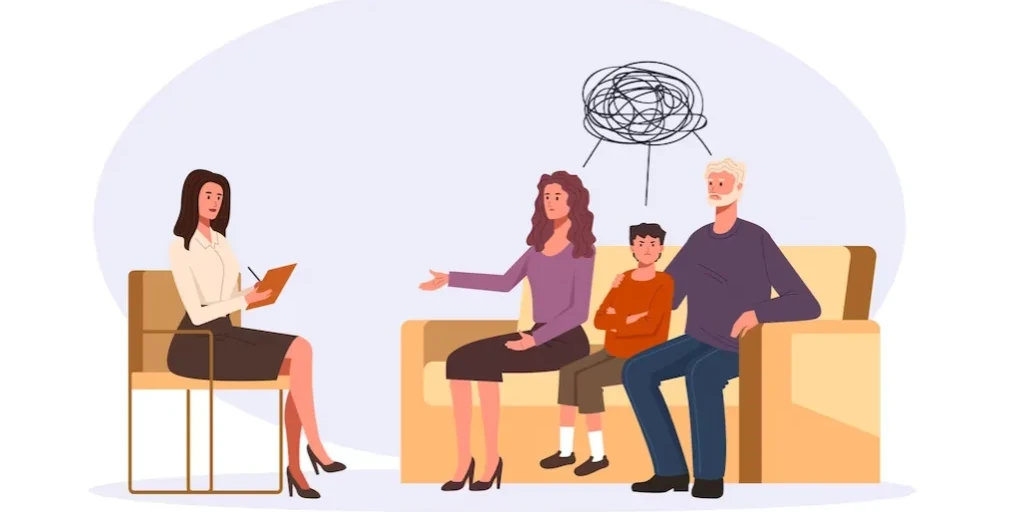24/7 Helpline:
(866) 899-221924/7 Helpline:
(866) 899-2219
Other Insurance Options

Humana

Ceridian

Lucent

Self-pay options

MHNNet Behavioral Health

CareSource

Kaiser Permanente

State Farm

Sutter

Coventry Health Care

Carleon

Covered California

Providence

Excellus

Aetna

PHCS Network

UnitedHealth Group

UMR

Group Health Incorporated

CareFirst










Preferred Family Healthcare
Preferred Family Healthcare - 3302 East Moore Avenue offers outpatient services for individuals with...

Capstone Treatment Center
Capstone Treatment Center in Judsonia, Arizona offers addiction treatment through their alcohol and ...

Mills Treatment
Mills Treatment is a drug and alcohol rehab in Searcy, Arkansas. They provide residential addiction ...

Central Arkansas Veterans Healthcare System – Searcy Outpatient Clinic
Central Arkansas Veterans Healthcare System – Searcy Outpatient Clinic is a drug and alcohol rehab i...
Beacon Light Behavioral Health
Beacon Light Behavioral Health is a private rehab located in Bradford, Pennsylvania. Beacon Light Be...

ADAS – Maple Manor
ADAS - Maple Manor is a residential treatment program for adults struggling with substance abuse iss...

Sovereign Health
Sovereign Health provides mental health and substance abuse services for adults and adolescents. The...

Emergence Health Network – EVOP
Emergence Health Network - East Valley Outpatient is a public rehab located in El Paso, TX. Emergenc...

Recovery Alliance of El Paso – Casa Vida de Salud
Recovery Alliance of El Paso–Casa Vida de Salud is a 12 step-focused drug and alcohol rehab for adul...

Tigua Indian Reservation – Substance Abuse Program
Tigua Indian Reservation – Substance Abuse Program is a drug and alcohol rehab located in El Paso, T...

Northeast Fellowship
Northeast Fellowship is a drug and alcohol rehab in El Paso, Texas that specializes in providing tre...

Alternative Centre for Behavioral Health
Alternative Centre for Behavioral Health is a private rehab located in El Paso, Texas. Alternative C...

Homeward Bound – Trinity Recovery Center
Homeward Bound – Trinity Recovery Center is a private rehab located in El Paso, Texas. Homeward Boun...

El Paso Behavioral Health System
El Paso Behavioral Health is a private 163-bed psychiatric hospital located in El Paso, Texas, speci...

MedMark Treatment Centers
MedMark Treatment Centers offers outpatient medication assisted treatment for opiate addiction by th...

Emergence Health Network – 1601 Yandell street
Emergence Health Network – 1601 Yandell Street is a drug and alcohol rehab located in El Paso, Texas...

El Paso Psychiatric Center
El Paso Psychiatric Center is a public rehab located in El Paso, Texas. El Paso Psychiatric Center s...

El Paso Behavioral Health – East
El Paso Behavioral Health - East provide a wide range of services and programs that offer evidence-b...

Rio Vista Behavioral Health
Rio Vista Behavioral Health is a private rehab located in El Paso, Texas. Rio Vista Behavioral Healt...

Ministerio En Victoria
Ministerio En Victoria is a non-profit rehab located in El Paso, Texas. Ministerio En Victoria speci...

Aliviane
Aliviane Inc is located in El Paso, Texas. Aliviane Inc provides the West Texas area with comprehens...

Emergence Health Network – Boeing Drive
Emergence Health Network – Boeing Drive is a public rehab located in El Paso, Texas. Emergence Healt...

Averte
Averte is an addiction treatment provider for adults, based in Bradford, Vermont. They also provide ...

Valley Vista
Located in Bradford, Vermont, Valley Vista is an alcohol and drug rehab facility that provides gende...













Preferred Family Healthcare
Preferred Family Healthcare - Highway 5 offers outpatient services for individuals with a mental hea...

The Pointe Outpatient Behavioral Health Services – Searcy
The Pointe Outpatient Behavioral Health Services – Searcy is a drug and alcohol rehab in Searcy, Ark...

Preferred Family Healthcare – Hawkins
Preferred Family Healthcare - Hawkins offers outpatient services for individuals with a mental healt...

Community Counseling Services
Community Counseling Services is a public rehab located in West Point, Mississippi. Community Counse...

Southlight Healthcare
Southlight Healthcare - Spring Drive offers inpatient services for women and women with children dea...

Strategic Behavioral Center – Raleigh
Strategic Behavioral Center – Raleigh is a private rehab located in Garner, North Carolina. Strategi...

First Step Services
Located in Garner, North Carolina, First Step Services offers alcohol and drug rehab services to men...

Deerfield Behavioral Health
Deerfield Behavioral Health is a unique group medical practice that provides a range of outpatient a...

Alcohol and Drug Abuse Services
Alcohol and Drug Abuse Services provides outpatient addiction treatment and co-occurring services fo...

New Beginnings – Outpatient
New Beginnings – Outpatient is a private rehab located in El Paso, Texas. New Beginnings – Outpatien...

AA – Alcoholics Anonymous – Intergrupal Hispana
AA – Alcoholics Anonymous – Intergrupal Hispana is a non-profit rehab located in El Paso, Texas. AA ...

Wood Rehab Center
Wood Rehab Center is a private rehab located in El Paso, Texas. Wood Rehab Center specializes in the...

Aliviane Recovery Center For Men
Aliviane Recovery Center For Men is a private rehab located in El Paso, Texas. Aliviane Recovery Cen...

Aliviane – Women and Children Residential
Aliviane provides services of promotion, prevention, intervention, treatment, and recovery programs ...

AA – Alcoholics Anonymous
AA – Alcoholics Anonymous is a non-profit rehab located in El Paso, Texas. AA – Alcoholics Anonymous...

Alano Club
Alano Club is a non-profit rehab located in El Paso, Texas. Alano Club specializes in the treatment ...

Al Anon and Al Ateen Information Center
Al Anon and Al Ateen Information Center is a non-profit rehab located in El Paso, Texas. Al Anon and...

Al Anon
Al Anon is a non-profit rehab located in El Paso, Texas. Al Anon specializes in the treatment of alc...

El Paso Behavioral Health – Northeast
El Paso Behavioral Health - Northeast provides a wide range of services and programs that offer evid...

Counseling Center of Expressive Arts
Counseling Center of Expressive Arts is a private rehab located in El Paso, Texas. Counseling Center...

Sunwest Behavioral Health Organization
Sunwest Behavioral Health Organization is a private rehab located in El Paso, TX. Sunwest Behavioral...

Atlas Rehabilitation Center
Atlas Rehabilitation Center is a private rehab located in El Paso, Texas. Atlas Rehabilitation Cente...

Sober Sources Network
Sober Sources Network is a private rehab located in El Paso, Texas. Sober Sources Network specialize...

Bradford Farm House
Bradford Farm House is a private rehab located in Bradford, Vermont. Bradford Farm House specializes...





















































































































































































































